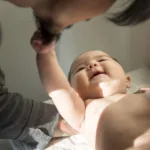Could This Play-Based Intervention Be the Key to Unlocking Language Potential in Children with Galactosemia?
New research suggests that a parent-implemented intervention program called Babble Boot Camp (BBC) may hold the key to preventing speech and language disorders in children diagnosed with classic galactosemia (CG). This exciting news comes from a research team at Arizona State University, who are studying the impact of early intervention on children with CG, a rare genetic condition that affects their ability to process a specific sugar called galactose.
This article delves into the groundbreaking research being conducted by Dr. Beate Peter and her colleagues, published in the American Journal of Speech-Language Pathology. This research focuses on exploring whether proactively supporting the earliest communication signals in infancy can pave the way for improved speech and language outcomes later in life.
The Challenge of Classic Galactosemia
Before we explore the promising results of this study, it’s important to understand the challenges faced by children diagnosed with CG. This genetic condition, if not detected and addressed early, can lead to a buildup of galactose in the bloodstream, causing a range of serious health problems. Thankfully, newborn screening programs in the United States allow for early diagnosis and treatment, which typically involves a lifelong lactose-restricted diet.
While this dietary intervention is crucial for managing the physical symptoms of CG, many children still face developmental challenges, including a significantly higher risk for speech and language disorders. Studies indicate that between 40% and 85% of children with CG experience speech sound disorders (SSDs), making it difficult for them to pronounce words correctly. Additionally, 50% to 78% of these children grapple with developmental language disorder (DLD), which impacts their ability to understand and use language effectively. These challenges can have a lasting impact on a child’s academic, social, and emotional well-being.
Introducing Babble Boot Camp: A Novel Approach to Early Intervention
The BBC program takes a proactive, parent-powered approach to nurturing communication skills in infants identified as being at risk for speech and language disorders. Trained speech-language pathologists (SLPs) guide parents through a series of engaging activities and routines designed to stimulate their baby’s communication development. These activities focus on strengthening the building blocks of communication, such as:
- Promoting Eye Contact: Encouraging babies to make and maintain eye contact, fostering connection and turn-taking in communication.
- Responding to Vocalizations: Parents learn to tune in and respond to their baby’s coos, gurgles, and babbles, creating a feedback loop that encourages further vocal exploration.
- Enriching Babbling: Specific techniques help parents elicit and shape their baby’s babbling sounds, increasing the complexity and variety of sounds they produce, which is linked to later language development.
- Building Vocabulary: Parents learn strategies to introduce and reinforce new words, expanding their child’s vocabulary and understanding of language.
- Modeling Speech Sounds: SLPs demonstrate how parents can model clear pronunciation of words, helping their child develop a rich repertoire of speech sounds.
- Expanding Sentences: Simple yet effective techniques guide parents in expanding their child’s short phrases into more grammatically complex sentences, gradually building their syntax skills.
The Study: A Glimpse into the Potential of BBC
Dr. Peter’s research team has been conducting a randomized controlled trial (the gold standard in research) to rigorously evaluate the effectiveness of the BBC program. Their study focuses on infants diagnosed with CG, a population known to be at a high risk for speech and language difficulties. The study design involved two main groups:
- Early Intervention Group: Infants in this group began the BBC intervention between 2 and 5 months of age.
- Delayed Intervention Group: Infants in this group began the intervention later, at 15 months of age.
To assess the impact of the BBC program, the researchers used a variety of measures, including:
- Mean Babbling Level (MBL): This measure assesses the complexity of sounds present in a baby’s babbling, providing insights into their early speech development.
- Syllable Structure Level (SSL): This measure evaluates the complexity of syllables a child uses when attempting meaningful words, offering insights into their developing speech production skills.
- MacArthur-Bates Communicative Development Inventories (CDI): This standardized parent-report questionnaire tracks a child’s receptive (understanding) and expressive (speaking) vocabulary development.
- Goldman-Fristoe Test of Articulation-Third Edition (GFTA-3): This standardized assessment, administered at follow-up, measures a child’s accuracy in producing speech sounds.
- Preschool Language Scales-Fifth Edition (PLS-5): This standardized assessment, also administered at follow-up, evaluates a child’s expressive and receptive language skills.
Promising Findings: Early Intervention Shows Potential
The research team’s findings, while still preliminary, offer encouraging evidence to support the potential of the BBC program. Here are some of the key findings:
- Enhanced Babbling Complexity: Infants who participated in the early intervention group demonstrated significantly higher MBL scores than those in the delayed intervention group. This suggests that the BBC activities effectively stimulated the development of more complex and varied babbling sounds, which are considered essential building blocks for later speech and language development.
- Increased Expressive Vocabulary: The early intervention group also demonstrated significantly higher expressive vocabulary scores on the CDI, indicating that the BBC program had a positive impact on their ability to use words. This finding aligns with previous research suggesting that children with CG tend to experience more challenges with expressive language (speaking) than with receptive language (understanding).
- Improved Articulation Skills: At follow-up assessments, children who received the early intervention showed a tendency toward better articulation skills as measured by the GFTA-3. This suggests that the early support they received through the BBC program may have contributed to their ability to produce clearer speech sounds.
The Future of Early Intervention: Building on Promising Results
Dr. Peter’s research offers a compelling glimpse into the potential of early, parent-mediated interventions like the BBC program to support the communication development of children with CG. While further research with larger sample sizes is needed to confirm these findings, the study provides a beacon of hope for families and professionals seeking effective strategies to promote communication development in young children at risk.
The study’s focus on parent training is particularly noteworthy. By equipping parents with the knowledge and tools to support their child’s communication journey, the BBC program empowers families to play an active role in fostering their child’s language development.
This research represents a significant step forward in our understanding of how early intervention can potentially mitigate the speech and language challenges often associated with CG. As research in this area continues to evolve, we can look forward to even more innovative and family-centered approaches to unlocking the language potential of all children.








